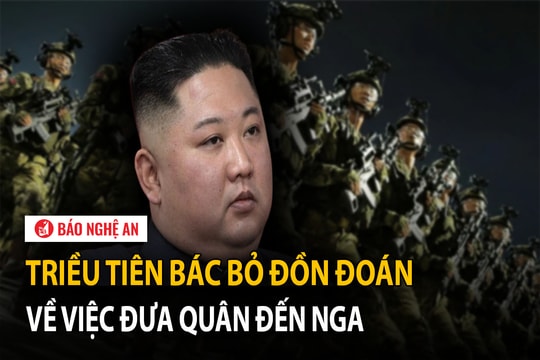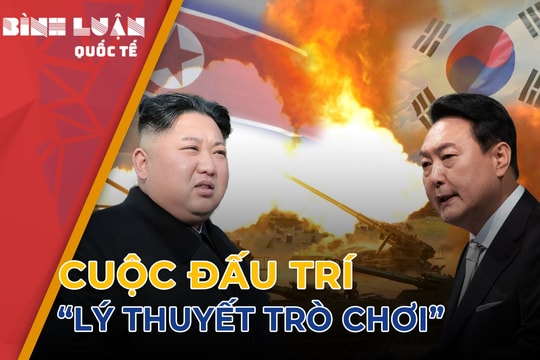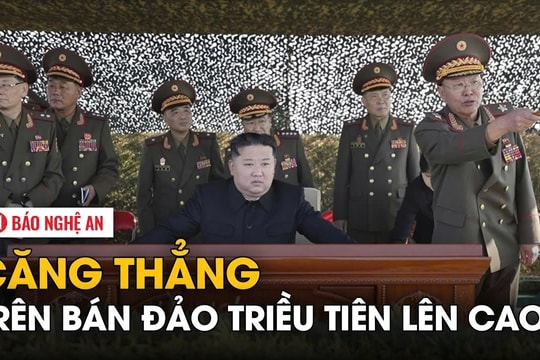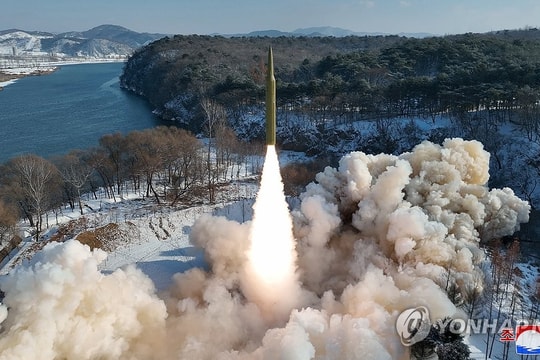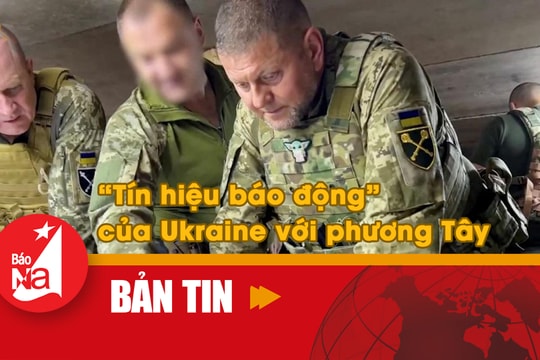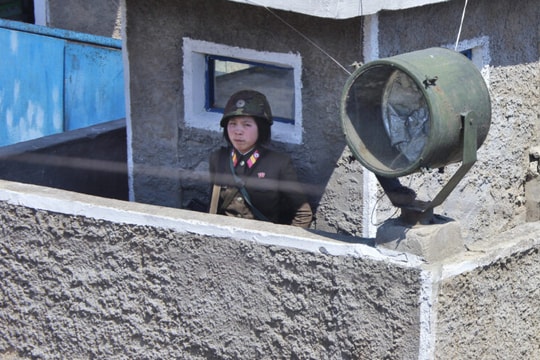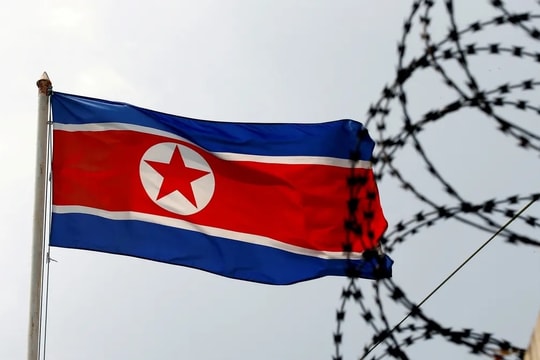Minister Ngo Xuan Lich's frank views at Shangri-La 2018
Vietnam does not align with one country against another; does not use force or threaten to use force in international relations; and does not allow foreign countries to set up military bases on its national territory.
We would like to respectfully introduce the full text of the speech on the topic "Shaping Asia's changing security order" by Minister Ngo Xuan Lich at this forum in the third discussion session on June 2:
Dear Mr. Chairman, Dr. John Chipman!
Dear all!
Over the past 16 years, the Shangri-La Dialogue has increasingly affirmed its important role in enhancing mutual understanding and cooperation for peace, security, stability and prosperity in the region. I would like to thank the International Institute for Strategic Studies, the Government and the Ministry of Defence of Singapore for allowing me to speak with you at this important meeting.
This year's Shangri-La Dialogue was attended by a large number of politicians, diplomats, military personnel and scholars representing countries in the region; especially the presence of Indian Prime Minister Narendra Modi with a very important speech yesterday. The opinions of the Prime Minister and a number of Ministers once again showed the desire for peace, security and stability in the region and the world.
At present, although we are actively cooperating to foster peace and stability in the region, we are also forced to recognize the reality that traditional and non-traditional security challenges, including territorial sovereignty disputes and terrorism, have been predicted and are clearly present, putting the Asia-Pacific region, full of potential and promise, in front of real and imminent dangers.
We are witnessing a strong shift in the policies of major countries towards the region. That is the shift in focus towards "Asia - Pacific", "Indo - Pacific" Strategy, "Belt and Road". And a series of group relations of countries (such as: China - Korea - Japan; Australia - India - Japan)... All declare to aim for peace and stability. However, the results for the region and the world are still what we look forward to. Therefore, I think the topic "Shaping Asia's changing security order" is very important, hopefully it will answer the big question for the region.
I would like to emphasize that the situation on the Korean Peninsula has recently shown positive signs. The efforts of North Korea, South Korea and many other countries give us hope that the United States, North Korea, South Korea and the indispensable role of other powers such as China, Russia... as well as the international community will continue to act responsibly for peace, security and denuclearization of the Korean Peninsula, contributing to regional peace and security. However, building peace and cooperation on the Korean Peninsula - and not only in North Korea - is still a long and difficult road.
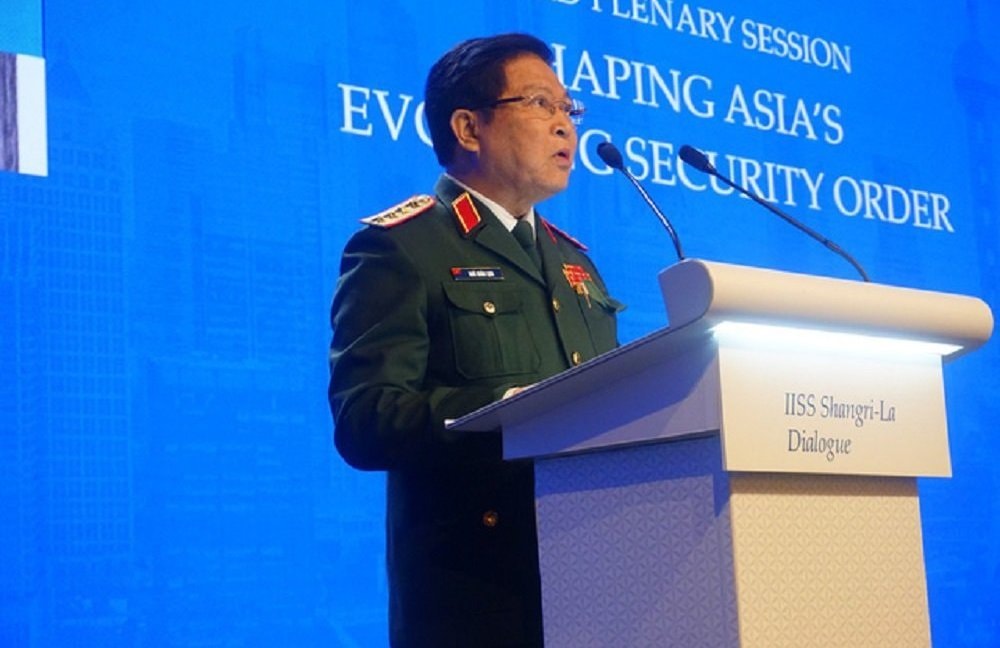 |
| Vietnamese Defense Minister Ngo Xuan Lich delivered the opening speech at the third discussion session at the 2018 Shangri-La Dialogue. |
Ladies and gentlemen!
The parties concerned sitting together, resolving disagreements and disputes by peaceful means, through dialogue; instead of confrontation, threatening to use force or unilateral action is the best way, which can solve many problems on the basis of common interests, respect for international law and regional mechanisms. From practice and experience, we believe that to solve complex security issues, each country must first decide its own destiny. At the same time, it is very necessary to support and join hands to act impartially, fairly, objectively, for the common interests of the international community, especially major countries.
With that perspective, the message I want to send to you today is: "Independence, self-reliance, enhanced cooperation, and compliance with international law are the foundation of security, peace, and development." So, to achieve that future vision, what kind of cooperation do we need?
- First of all, security structures and mechanisms must be based on international law, the fundamental principles of the United Nations Charter, recognized norms of conduct, regional commitments as the foundation and political consensus among parties on the basis of common interests.
- Build mutual trust through consultation, information exchange, high-level contacts and promote joint activities between military forces, strengthen military-civilian coordination. Most importantly, the parties must make policies transparent, demonstrate goodwill and determination, properly implement commitments and legal obligations; words must match actions.
- All parties, especially major powers, need to act responsibly; shoulder responsibility in the region's common efforts for peace, stability, cooperation and development. In particular, exercise restraint, not use or threaten to use force; and not conduct unilateral activities that further complicate the situation.
- Promote the effectiveness and expand and diversify dialogue and cooperation mechanisms on defense - security - politics and economy in the region and inter-region. Continue to promote information sharing and experience in crisis prevention and management, moving towards substantive cooperation; first of all in the fields of humanitarian assistance, disaster relief, law enforcement at sea, ensuring maritime and aviation security and safety, combating terrorism and piracy, etc. Research and develop new mechanisms to support parties in peacefully resolving security issues and disputes, especially complex issues such as the Korean Peninsula, the East China Sea, the South China Sea, etc., on the basis of respecting sovereignty and territory, complying with international law, and not interfering in each other's internal affairs. Encourage the use of dialogue channels to share and exchange perceptions of policymakers, aiming at a broader picture, beyond national interests.Ladies and gentlemen!
The Association of Southeast Asian Nations (ASEAN) is a successful model of cooperation and association of small and medium-sized countries; it increasingly plays a positive and central role in common efforts; it shapes the security structure, ensuring a peaceful and stable environment in Asia - Pacific. Reality has affirmed that a united and unified ASEAN is beneficial to all member countries and partner countries in conflict management, ensuring security and stability in the region on the basis of common interests and the interests of each country, in accordance with international law.
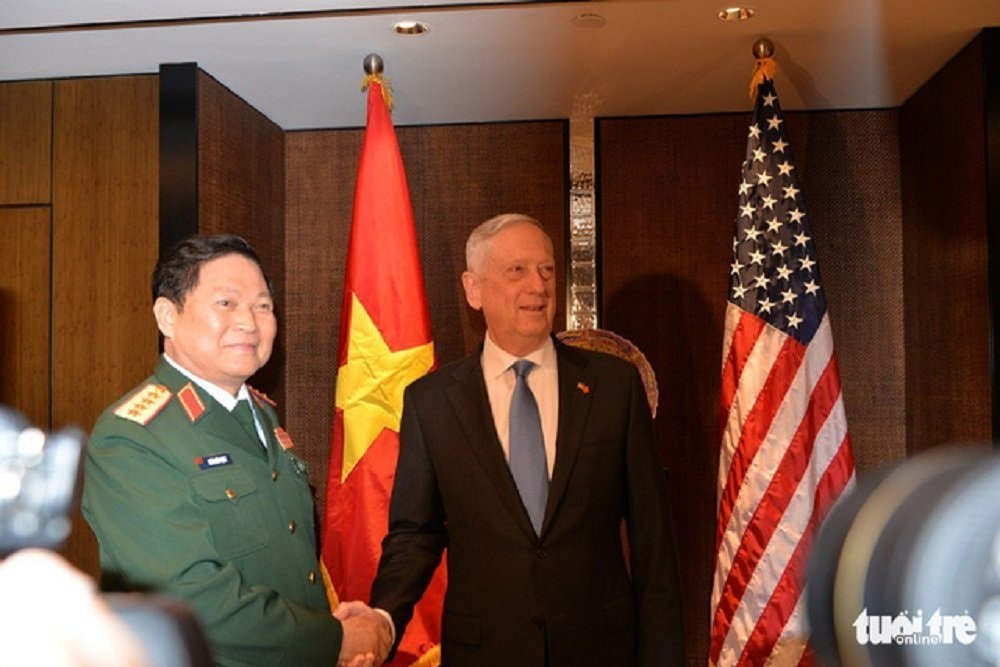 |
| Vietnamese Defense Minister Ngo Xuan Lich (left) and US Defense Secretary James Mattis at a meeting on the sidelines of the Shangri-La Dialogue on the morning of June 1. |
ASEAN's focus is on enhancing security assurance capacity; implementing confidence-building measures, preventive diplomacy and cooperation to find ways to resolve conflicts; and together with other countries to establish a solid security order. Currently, there are many mechanisms in which ASEAN plays a central role such as: ASEAN Regional Forum (ARF), ASEAN Maritime Forum (AMF), East Asia Summit (EAS), ASEAN Defense Ministers Meeting (ADMM)... Especially the ASEAN Defense Ministers Meeting Plus (ADMM+), which has widely gathered Asian countries and partner countries, plays an important role in promoting dialogue and high-level contacts to build trust, deploy diverse cooperation, and deal with non-traditional security challenges in many fields.
In 2020, Vietnam will assume the role of ASEAN Chair, marking the 10th anniversary of the establishment of ADMM+. We will do our best to present the Asia-Pacific Regional Security Vision (within the framework of ADMM+); Promote ASEAN's central role in association with the solidarity, unity and responsibility of ASEAN member states (within the framework of ADMM). Vietnam hopes to continue to receive the support and active participation of partner and dialogue countries as well as other countries, especially major countries; on the basis of respecting ASEAN's central role, so that ADMM+ can truly become an open and inclusive defense cooperation mechanism, aiming to mobilize collective strength to effectively deal with common security challenges.
Ladies and gentlemen!
Vietnam always cherishes the value of peace; persistently pursues a foreign policy of independence, self-reliance, peace, cooperation and development. Multilateralizes and diversifies international relations; maintains strategic balance in relations with other countries. Builds a peaceful, self-defensive national defense; does not align with one country against another; does not use force or threaten to use force in international relations; does not allow foreign countries to set up military bases on Vietnamese territory. Respects the independence, sovereignty, unity and territorial integrity of all countries, on the basis of international law and regional codes of conduct and demands the same from other countries. Vietnam is determined to protect its legitimate interests while also respecting the interests of other countries in accordance with international law.
Regarding the East Sea issue, we are steadfast in supporting the settlement of disputes by peaceful means, on the basis of international law, including the 1982 United Nations Convention on the Law of the Sea (UNCLOS 1982); complying with the Declaration on the Conduct of Parties in the East Sea (DOC), promoting the development of a Code of Conduct in the East Sea (COC); which is both a measure to build strategic trust between ASEAN and China and demonstrates the determination of countries to contribute to a regional security order based on international law. Any actions that violate the sovereignty of other countries, militarization and military build-up are inconsistent with international law and go against regional commitments. Instead, relevant parties need to demonstrate responsibility in building a maritime order, so that the East Sea is truly a sea of peace, cooperation and friendship.
In addition to the task of protecting national independence and sovereignty, the Vietnamese Army has been actively participating in the United Nations Sustainable Development Program and the Millennium Development Goals, including peacekeeping. Recently, in a short time, the Vietnamese flag and uniform have become familiar and trustworthy to the United Nations Mission and people in remote areas of Africa, which are suffering the severe consequences of conflict and war.
In a globalized world, the 4th industrial revolution is taking place strongly and security challenges are increasing, no country can develop if separated from the regional and world community. Destiny and responsibility are placed on each of us. Whether Asia and Southeast Asia can maintain peace, security and prosperity depends largely on our actions today. One of those efforts is to jointly build a mechanism and structure to ensure common security based on the basic principles of international law, mutual trust and responsible behavior of all parties.
On this occasion, I would like to congratulate and express my support for Singapore’s ASEAN Chairmanship and initiatives under the theme of “Resilience and Innovation”. This spirit will help ASEAN to be more steadfast in shaping the regional order, supporting, coordinating and promoting joint efforts for peace and stability, economic integration, and people-oriented based on the spirit of dialogue and cooperation.I am optimistic that with genuine and sincere cooperation from all of us, the storms in the Asia-Pacific will only make us closer and make greater efforts for the common interests and brighter future of each country and the whole region.
With that belief, I would like to end my speech with the famous saying of President Ho Chi Minh: "Security and freedom can only be guaranteed by the independence of each nation from any other great power and by the voluntary cooperation of each nation with all other great powers".
Thank you very much for listening!

